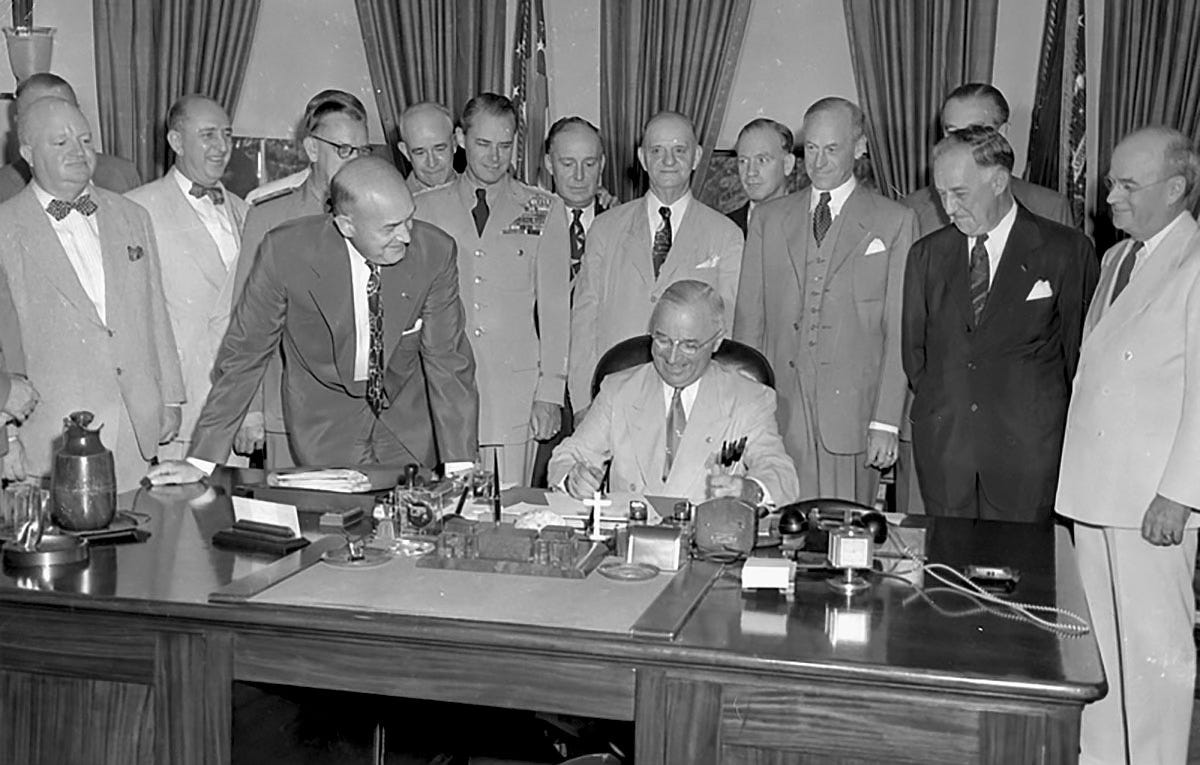This Day in Legal History: National Security Act of 1947
On this day in legal history, July 25, 1947, Congress passed the National Security Act of 1947, fundamentally reshaping the American national security infrastructure in the wake of World War II. The legislation created a unified framework to coordinate defense and intelligence operations, aiming to prevent the bureaucratic fragmentation that had plagued wartime decision-making. One of its central provisions was the formation of the National Security Council (NSC), designed to advise the president on domestic, foreign, and military policies related to national security.
The Act also established the Central Intelligence Agency (CIA), which replaced the wartime Office of Strategic Services (OSS) and became the first peacetime intelligence agency tasked with gathering, analyzing, and coordinating intelligence. Additionally, it created the National Military Establishment (later renamed the Department of Defense in 1949), which consolidated the War Department and the Navy Department under a single executive authority.
Within the National Military Establishment, the Act preserved the autonomy of the Army and Navy while officially creating a separate branch: the United States Air Force. It also formalized the Joint Chiefs of Staff to provide coordinated military advice to civilian leadership. These structural reforms sought to ensure more cohesive planning and execution of U.S. defense policy during a time of growing Cold War tensions.
The legislation marked a profound shift in how the federal government approached global strategy, institutionalizing the military-intelligence bureaucracy that would define American power projection for decades. It also laid the legal groundwork for the modern national security state, with broad implications for executive authority, covert operations, and civil-military relations. As Cold War dynamics evolved, the institutions born from this Act became central to both overt diplomacy and covert action around the world.
Ghislaine Maxwell, currently serving a 20-year sentence for aiding Jeffrey Epstein’s abuse of minors, is petitioning the U.S. Supreme Court to overturn her conviction. Her legal team argues that a 2007 non-prosecution agreement made with Epstein in Florida should have shielded her and other associates from future federal prosecution. The case raises a significant legal issue: whether plea deals made by one U.S. Attorney’s Office bind other federal jurisdictions. This question has divided circuit courts, increasing the chances the Supreme Court might take up the case when justices return from summer recess in late September.
The Justice Department under Trump acknowledged the legal split but urged the Court to deny Maxwell’s appeal, arguing that plea agreements are binding only between the negotiating parties. Maxwell’s defense contends the 2007 deal’s broad language promised immunity for co-conspirators nationwide, and that allowing prosecutors to renege undermines trust in the justice system. The National Association of Criminal Defense Lawyers supports her petition, citing the widespread use of plea agreements in American jurisprudence.
The case unfolds amid renewed political pressure over Epstein-related disclosures, with Trump’s administration walking back earlier commitments to release more records. The political sensitivity may affect the Supreme Court’s willingness to get involved, especially given the presence of three Trump-appointed justices. Columbia Law professor Daniel Richman noted the unusual breadth of Epstein’s original deal might make this a poor case for setting a national precedent, despite its legal significance.
Amid Epstein furor, Ghislaine Maxwell seeks relief from US Supreme Court | Reuters
The Trump administration has asked the U.S. Supreme Court to allow it to implement major funding cuts to National Institutes of Health (NIH) grants, arguing the cuts align with its broader effort to dismantle federal diversity, equity, and inclusion (DEI) programs. A lower court had blocked the move in June, with U.S. District Judge William Young ruling that the cuts were unlawfully arbitrary and lacked clear justification, violating administrative law. The decision came after lawsuits from a coalition of researchers, public health groups, and 16 states led by Democratic administrations, who argued the grant cancellations were politically motivated and targeted research associated with DEI or gender identity.
The administration contends that continuing to pay the $783 million in grants contradicts its policy goals. The Justice Department is also challenging the venue of the lawsuits, arguing they should have been brought in the Court of Federal Claims, which specializes in monetary claims against the federal government. The 1st U.S. Circuit Court of Appeals recently rejected that argument, refusing to pause Judge Young's ruling.
Judge Young, despite being a Reagan appointee, sharply criticized the administration’s actions as lacking any rational explanation and as ideologically driven. He noted that officials failed to define DEI while broadly discrediting grant-supported research without evidence. Critics, including NIH employees and scientists, have warned that the cuts undermine scientific integrity and public health.
The Supreme Court, now with a 6-3 conservative majority, has been receptive to Trump administration appeals in similar cases. In April, it allowed comparable cuts to teacher training grants to proceed. The administration hopes for a similar result in this case.
Trump administration asks US Supreme Court to allow NIH diversity-related cuts | Reuters
Glass Lewis and Institutional Shareholder Services (ISS), two leading proxy advisory firms, have filed lawsuits against Texas over a new state law restricting their ability to advise shareholders on environmental, social, governance (ESG), and diversity, equity, and inclusion (DEI) matters. Proxy advisors provide independent recommendations to institutional investors—such as pension funds and asset managers—on how to vote on issues at shareholder meetings, including board elections, executive compensation, and corporate policies. This means their influence is significant in shaping corporate governance across markets.
The new Texas law, signed by Governor Greg Abbott, requires these advisors to include disclaimers stating their recommendations may not be in the financial interest of shareholders and to back up ESG or DEI-related advice with financial analysis. Glass Lewis and ISS argue the law violates their First Amendment rights by forcing them to include government-mandated speech that contradicts their independent analysis and perspectives.
Filed in federal court in Austin, the lawsuits name Attorney General Ken Paxton as the sole defendant. Both firms contend the law is politically motivated and will damage their reputations, cost them clients, and undermine shareholder oversight of corporate boards. ISS also criticized the law as serving to protect corporate executives from accountability, labeling it "anti-capitalist" and counter to shareholder interests.
The legal challenge comes amid a broader rollback of corporate DEI programs nationwide and is part of a trend in Republican-led states to push back against what they see as left-leaning influence in financial decision-making. The law is scheduled to take effect on September 1, unless blocked by the court.
Glass Lewis, ISS sue Texas over law limiting DEI, ESG proxy advice | Reuters
This week’s closing theme is by Enrique Granados.
This week’s closing theme is Granados’ masterwork Goyescas, Op. 11, a piano suite composed in 1911 and widely regarded as the Spanish composer’s magnum opus. Subtitled Los majos enamorados (The Gallants in Love), the suite captures the spirit and elegance of 18th-century Madrid, evoking a romanticized world of passionate young lovers, elaborate dress, and melancholic reverie. Granados drew inspiration from the art of Francisco Goya, though the individual pieces are not linked directly to specific paintings. Instead, they are tonal impressions—musical vignettes steeped in the colors and textures of Goya’s Spain.
Goyescas is divided into two books. Granados premiered Book I on March 11, 1911, at the Palau de la Música Catalana in Barcelona, showcasing his own virtuosic pianism. Book II followed in December of that year and was first performed in Paris at the Salle Pleyel on April 2, 1914. Each movement in the suite is rich with rhythmic flair, lyrical warmth, and emotional depth, capturing the elegance of Spanish courtship rituals and the melancholy undercurrents of unfulfilled longing.
The suite’s most famous piece, Quejas, o La Maja y el Ruiseñor (Lament, or The Maiden and the Nightingale), would later be famously echoed in the song “Bésame Mucho.” Granados’ idiomatic use of ornamentation, rubato, and folkloric rhythms set a high watermark for Spanish piano music and influenced later composers such as Albéniz and Falla. Through Goyescas, Granados created a work that is both a tribute to Goya’s vision and a deeply personal expression of turn-of-the-century Spanish romanticism.
Without further ado, Enrique Granados’ The Gallants in Love, the third movement, El Fandango del Candil. Enjoy!














